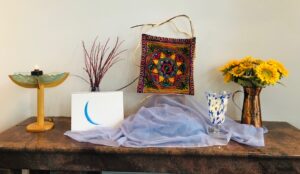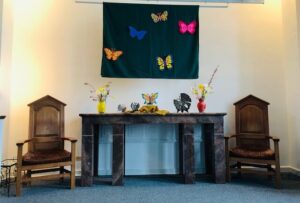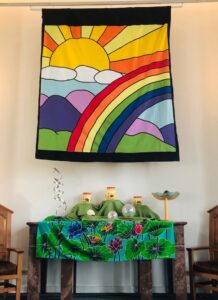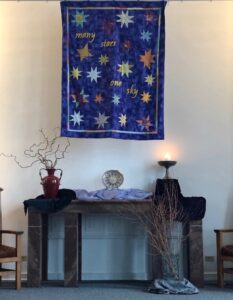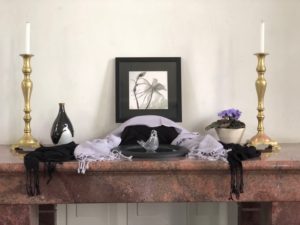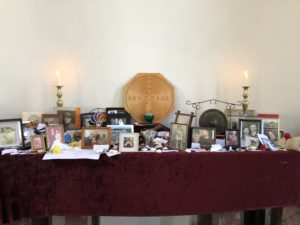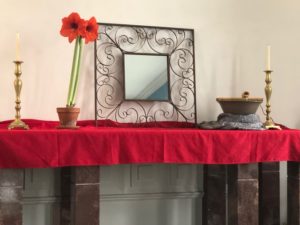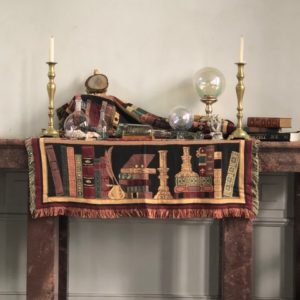Langston Hughes wrote “I Dream a World” in 1929. 34 years before the Rev. Dr. Martin Luther King, Jr. famously talked about his dream in front of approximately a quarter of a million people at the Lincoln Memorial in 1963. Another 49 years would pass before the UUA published the Tapestry of Faith curricula, “Building the World We Dream About.” There’s a whole lot of dreaming going on.
Which should hardly be surprising. It takes dreamers to imagine a world other than the world as it is, a world where “[one person] no other [person] will scorn, where love will bless the earth and peace its paths adorn.” As Rodgers and Hammerstein put it, admittedly in a very different context, “You gotta have a dream, if you don’t have a dream, how you gonna make a dream come true?”
Yet there’s a danger here – a danger perhaps especially for good-hearted, well-meaning liberal white folk like … well … like most of us here this morning and most of us in our Unitarian Universalist faith. The Rev. Nancy McDonald Ladd, easily one of my top two or three UU preachers, has recently published her first book – After the Good News: progressive faith beyond optimism. The description on the back of the book says, “With humor and humanity, Ladd calls religious progressives to greater authenticity and truth-telling rather than blind optimism.” There is definitely humor and humanity in this book, and also courage; compassion; boldness; truth-telling (to be sure); history; rebuke; challenge; hope; deep, deep thinking; and oh so much love. She know us; she loves us; she is us; and from within that knowing, loving, and being she writes:
“For much of the past hundred years, even through wars, devastation, and the insidious persistence of systemic racism, modernist religious liberals in Eurocentric churches [meaning us] have preached about our near-unlimited capacity to fix just about everything that is broken. We believe in ourselves so completely that the ‘good news’ has become a good word about our own capacity to heal things, leaving little room for honest atonement or our own complicity in brokenness.”
She says,
“[Y]es, with Theodore Parker and Dr. King, we believe that ‘the arc of the moral universe is long, but it bends toward justice,’ … [but] why are we so quick to focus on the ‘bending toward justice’ bit rather than honestly addressing the maddeningly long length of the arc – especially for people who live and struggle and lead at the margins of power?”
Because – and these are my words now – religious liberals, including us, have become comfortably complacent and complacently comfortable in our role as the shining beacon, the moral compass, pointing the way to that Beloved Community we “dream about.” We look around us and see the morass of misogyny, the depths of depraved white supremacy, the incomprehensible income inequality, the xenophobia, the anti-Muslim, anti-immigrant, anti-transgender, anti-homosexual, anti-Semitic, anti- … well … the anti-just-about-anything-that-isn’t-white, we look around us and see all of that and know with absolute certainty that we offer both an alternative and an antidote. We look around us “out there” and see all of that, and we look around us “in here” and see all of these beautiful, good-hearted, well-meaning, truly inspiring liberal folk who have in so many cases dedicated their lives to changing thatworld into the world we dream of. (The fact that we are mostly white, mostly middle class, mostly well educated is seen as nothing more than a coincidence.)
My parents raised their children to be feminists, non-racists, believers in the vision, the dream, of a world in which all people are welcomed, in which everyone – absolutely everyone – had a seat at the table. The problem is, as Nancy points out (and I’ll quote her again):
“[T]he table progressive religion invites everyone to, no matter how broad and expansive it may be, is almost always set by people who believe they are white. Those same white people who set the table have chosen to repeatedly align that white identity with the predominant power structures of their day.
Among the difficult truths we are called to grapple with is the fact that oppressive power structures undergird every single era of progressive optimism in this country. […] the great institutions of liberal faith were and are inextricably interconnected with systems of supremacy, patriarch, and oppression.”
Last week was the one-year anniversary of a racist attack on a member of our community most likely by a member of our community. Our Director of Administration and Finance, Christina Rivera, came in to work, took her mail out of the box on her office door, and found among the bills and requests for rooms an anonymous racist note that was directed not only at her, but at her husband and her kids. One year ago I responded to this attack, as did the senior leadership of this congregation, strongly and clearly, and holy – or unholy – hell broke loose. [Here is Christina’s own response.]
I had preached on racism before. I had begun to use the term “white supremacy” before, a term which scholars and activists of color have said is a more accurate description of what had heretofore been called, simply, “racism.” I said unequivocally that if we’re serious about dismantling the systems and structures of the white supremacy culture, if we’re serious about changing the world “out there” as it is now, into the truly multi-cultural Beloved Community we dream about, then we who identify or are identified as white will need to be the ones who change. We will need to face, and deal with, the discomfort that unavoidably comes with change. We will have to become “comfortable with being uncomfortable,” or, as Dr. King put it so marvelously, we are going to have to be “maladjusted.”
Time after time, sermon after sermon, I preached this same message – we, those of us who identify, or are identified, as white are going to have to shoulder the cross of dis-ease, dis-equilibrium, discomfort – and was greeted with the white liberal equivalent of shouts of “Amen!” and “Preach it brother.” On that handshake line over there person after person said that I was “brave,” and “bold,” and “saying what needs to be said.”
And then, one year ago, I actually made us uncomfortable. I had the audacity to disrupt our equilibrium. I said that we – good hearted, well meaning, liberal white folks who have unquestionably toiled mightily in the vineyards of social change and the movements for justice – that we are complicit in the racism that revealed itself in our own home. And more than that, I said, unequivocally, that whoever wrote that note is not welcome here. And boy did people get upset.
In her truth-telling Nancy says, “Those who are accustomed to privilege consider it reasonable to expect comfort and assurance of their own fundamental decency.” She doesn’t exclude herself from this truth, and neither do it. Yet when we – those of us who identify, or are identified, as white – really and truly open ourselves up to seeing with new eyes, looking beyond, or through, the veil of the norms and assumptions of our cultural inculcation we will have to acknowledge that we – as individuals and as institutions – often unconsciously participate in, and unwittingly perpetuate those systems and structure upon which our society is built.
In especially potent section of her book, Nancy takes us backward from the liberal church we know today, back through our history, to show us our roots:
“Well past the beginning of the twenty-first century, liberal churches continued to remember the good old days of twentieth-century modernism. The great modernist churches of the mid-twentieth century were tied to the concept of unending societal potential birthed after the industrial revolution. That vison of unending societal potential was in turn tied to patriarchal and racially unjust systems that benefited from the oppression they decried.
The prevailing cultural and socioeconomic ethos of this gospel of unending progress was built by and for white men with significant power. They exercised that power through seemingly benevolent dominion over the earth, its peoples, and its mysteries alike.”
She concludes,
“So, that explains a lot of things.”
We are complicit, all of us are. How could we not be? Unless we are consciously and pro-actively creating and living in radically new ways of being in the world, then we are reinforcing the way things are right now whether we want to or not. Whether we declare our desire to change things. Even as we work for the transformation of society. Unless we are willing to live within a transformed reality ourselves while we do so, we are working against ourselves unaware.
This doesn’t mean that we are bad people. We’re not. This doesn’t mean that there is no distinction between us and those who carried tiki torches through our city two years ago. There obviously is. This doesn’t mean that we should flagellate ourselves with whips of guilt and shame. We are, we truly are good-hearted, well-meaning folks who put our hearts, minds, and souls into fighting the good fight and striving for our mutual liberation.
This does mean that we need to recognize that if there is ever going to be change in this world, we – especially those of us who identify or are identified as white – are going to have to learn to be “comfortable being uncomfortable” …even when we are actually made uncomfortable! It does mean that we’re going to have to recognize that some of what we hold sacred, even some of our most cherished ideals and values that we have for so long bravely and lovingly espoused, even these must be examined for their unintended consequences and their role in perpetuating what we are working to dismantle.
And it means that when we dream dreams, when we see visions, when we strive to build a new way out of the world as it is toward the world as we know it can be, we have to make sure that they’re not just our dreams, conditioned as they unavoidably are by the culture in which we “live, and move, and have our being.” It means that we need to listen to the dreams of those who have been historically, and who are still, relegated to the margins, to make their dreams our dreams, even when, and perhaps especially when, those dreams challenge our comfort and threaten to upend everything we know about ourselves.
This is scary my friends. And believe me, it’s as scary for me as it is for you because it’s new terrain for all of us and little in the life I’ve lived so far has prepared me for this. I do not, can not, know what the future will look like, or the path to get there, because it is a new future we are called to build, unlike, and not simply an extension of what we have known. Yet if we hold one another in love – whether we see things the same way, or say things the same way, or strive in the same ways – then we can, together, be part of helping that dream become a reality.
I’ll end with the words of one of my predecessors in this pulpit, the Rev. Wayne Arnason:
Take courage friends.
The way is often hard, the path is never clear,
and the stakes are very high.
Take courage.
For deep down, there is another truth:
you are not alone.
Amen.
Pax tecum,
RevWik
During the first service, I realized that I needed to trim my reflections before going in to the second. The proverbial “cutting room floor” is often home to passages that, for one reason or another, were important or intriguing enough to include yet, ultimately, are not enough of either of those things to remain in the final draft. Thus it always is for writers.
I remember once, early in my preaching career, emailing a sermon to a friend for her opinion. Something just wasn’t right about it, but I really couldn’t tell what. After reading through it she wrote back, “Erik, that’s two of the best sermons I’ve ever read.” One of them ended up on that floor.
Still, that second sermon found its way off the floor and into the pulpit at some point, and today I want to expand on one of the things I didn’t get too on Sunday.
This summer I read a fascinating book – Octavia’s Brood: science fiction stories from social justice movements.
Octavia E. Butler was a science fiction author — the first science fiction author to be awarded the prestigious MacArthur Fellowship. She was also something of a rarity in the world of science fiction literature for another reason: there haven’t been a lot of African American science fiction writers. Her Wikipedia article notes that,
“Butler began reading science fiction at a young age, but quickly became disenchanted by the genre’s unimaginative portrayal of ethnicity and class as well as by its lack of noteworthy female protagonists. She then set to correct those gaps by, as De Witt Douglas Kilgore and Ranu Samantrai point out, “choosing to write self-consciously as an African-American woman marked by a particular history”—what Butler termed as “writing myself in”. Butler’s stories, therefore, are usually written from the perspective of a marginalized black woman whose difference from the dominant agents increases her potential for reconfiguring the future of her society.”The editors of Octavia’s Brood — Sheree Renée Thomas and Walidah Imarisha — dedicate their anthology to Butler:
“To Octavia E. Butler, who serves as a north star for so many of us. She told us what would happen — “all that you touch you change”–and then she touched us, fearlessly, brave enough to change us. We dedicate this collection to her, coming out with our own fierce longing to have our writing change everyone and everything we touch.”The 23 contributors are, as Thomas describes them in her Introduction, “artists who in their other lives work tirelessly as community activists, educators, and organizers.” Imarisha notes in her Introduction that one of the things that makes this project so fascinating and exciting is that, “many of the contributors […] had never written fiction before, much less science fiction.” She writes,
“When we approached folks, most were hesitant to commit, feeling like they weren’t qualified. But overwhelmingly, they all came back a few weeks later, enthusiastically, with incredible ideas and some with dozens of pages already written. Because all organizing is science fiction, we are dreaming new worlds every time we think about the changes we want to make in the world.”That idea is what intrigued me and led me to include a reference to this in my last reflections. I realized, though, that I could make the point I was trying to make without this reference and that, actually, this deserved more room than I could have given it there.
“All organizing is science fiction.” Think about that for a minute; let it sink in. Whenever anyone works for justice, whenever anyone strives to help transform the world from what it is now into what we know it can be, we’re essentially painting a picture of a world that does not (yet) exist. That’s the work of science fiction — to show us alternatives to the reality we know. Imarisha says,
“Whenever we try to envision a world without war, without violence, without prisons, without capitalism, we are engaging in speculative fiction. All organizing is science fiction. Organizers and activists dedicate themselves to creating and envision another world. […]”
J.R.R. Tolkien wrote a great deal more about Middle Earth than showed up in The Hobbit or The Lord of the Rings. One of the reasons the world he created feels so rich, so full, so real, is because he knew more about it than what he needed to tell us for his stories. And you can sense it. You can feel it.
He even wrote his own creation story for this world. The Ainulindalë is a really beautiful and profound myth; it’s actually my own favorite of all the creation myths I’ve ever encountered. It is the one that feels most “true.” Simply put, Eru Ilúvatar, the One, creates the universe and all that’s in it through music.
“The story begins with a description of the Ainur as “children of Ilúvatar’s thought”. They are taught the art of music, which becomes the subject of their immortal lives. The Ainur sing alone or in small groups about themes given to each of them by Ilúvatar, who proposes a “great” plan for them all: a collaborative symphony where they would sing together in harmony.” (Wikipedia)There are a number of important details, meaningful nuances, that I would hate to rush past. I encourage you to get a copy of The Silmarillion, which collects much of this “backstory,” or Google around until you find a copy of the text online somewhere.
The reason I bring all of this up is the way the story ends. After the “collaborative symphony” is complete, Ilúvatar invites the Ainur to look at what they’d created together. They do, and it is beautiful. It is good. And then everything vanishes. Void. Emptiness. And then Ilúvatar tells the Ainur to go into that emptiness and bring into being all that they saw.
I get shivers — The Ainur are shown not just the blueprint, but the total, finished reality of all creation, and then they’re tasked with actually making it real.
When I read Thomas’ and Imarisha’s words about organizers and activists being engaged in science fiction I immediately thought of Tolkien’s myth. Those who work for justice are those Ainur who have seen this not-yet world right here in the midst of the world as-it-is, and they have set upon the work of bringing into being what they’ve seen. In another way they are Ilúvatar, showing their vision to anyone “with eyes to see” (as Jesus is remembered as putting it), and engaging them in the work of world building.
Perhaps all this talk about myths and science fiction seems trivializing of the real life-and-death struggle that is this world for far, far too many. We don’t need pretty stories. We need action! That later part is right, but the former misses an important truth. Walidah Imarisha explains in her Introduction the importance of engaging the imagination in the work for societal transformation:
“[T[he decolonization of the imagination is the most dangerous and subversive form there is: for it is where all other forms of decolonization are born. Once the imagination is unshackled, liberation is limitless.”
Sheree Renée Thomas adds one fascinating thought:
“[T]hose of us from communities with historic collective trauma, we must understand that each of us is already science fiction walking around on two legs. Our ancestors dreamed us up and then bent reality to create us.”As someone from a historically centralized position, this reminds me that I have to listen not so much to the dreams of my ancestors, to the science fiction that comes out of my history. Why? Because that’s the world we’re living in. The world that was imagined, the vision that was dreamed and worked for by straight, white, cis-male folks with good educations and incomes has already been brought into being. It’s the world that’s so in need of transformation into something new.
This doesn’t mean that my ancestors have nothing of value to offer, that their vision offers no beauty or strength. It does mean, though, that if we’re serious about bringing a new world into being then the movers and shakers of this world need to start listening to new stories, new dreams. Or, rather, new to me. These stories, these dreams, this visions have always been here; they’ve just been largely displaced by those that brought us to where we are. Reading the stories collected in Octavia’s Brook opened for me a library the existence of which, I confess, I was only faintly aware. There is so much more to read, and it pains me that I’m only discovering it at 56. (At least I’m not first discovering it at 57!)
Pax tecum,
RevWik

